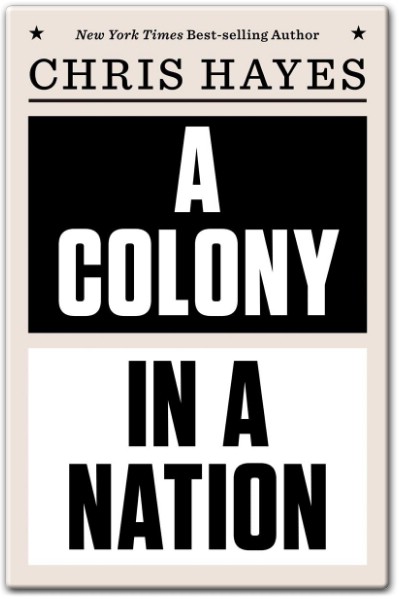
A Colony in a Nation by Chris Hayes Details & Statistics
| Attribute | Details |
|---|---|
| Publisher | W. W. Norton & Company; First Edition (March 21, 2017) |
| Language | English |
| Paperback | 256 pages |
| ISBN-10 | 0393254224 |
| ISBN-13 | 978-0393254228 |
Statistics of A Colony in a Nation by Chris Hayes
Book Rankings:
- #91,941 in Books (Overall)
- #270 in Political Commentary & Opinion
- #292 in Political Conservatism & Liberalism
- #367 in Discrimination & Racism
Customer Reviews:
- Rating: ⭐ 4.6 out of 5 stars
- Total Reviews: 1,344
Genres:
- Nonfiction
- Politics
- History
- Race
- Sociology
- Social Justice
A Colony in a Nation by Chris Hayes Quotes
In the Nation, there is law; in the Colony, there is only a concern with order. In the Nation, you have rights; in the Colony, you have commands. In the Nation, you are innocent until proven guilty; in the Colony, you are born guilty.
Depending on who you are, the sight of an officer can produce either a warm sense of safety and contentment or a plummeting feeling of terror. I’ve
And in America, when the state cultivates such fear among relatively empowered white voters, it is enriching uranium for a political nuclear weapon. It
According to statistics compiled by the Washington Post, in 2015 a full quarter of those shot and killed by police were suffering from mental illness
The criminal justice system is not a ‘system’ at all,” Pfaff writes, “and treating it as such can lead analysts to overlook important causes of prison growth.
This is the central component of the white fear that sustains the Colony: the simple inability to recognize, deeply, fully totally, the humanity of those on the other side.
White fear is both a social fact and something burned into our individual neural pathways.
To be outnumbered and afraid in a land not your own, and to attempt to bring it under your control—this is the great recurring theme of the American project, and it is shot through at every moment by fear and violence and subjugation
As a theory, “broken windows” played a perfect explanatory role for politicians and policy makers. If disorder leads to crime, well then, we need to crack down on disorder.
Presented with a challenge to its power, an illegitimate regime will often overreact, driven by the knowledge that all they have is force.
White fear emanates from knowing that white privilege exists and the anxiety that it might end.
A Colony in a Nation by Chris Hayes Table Of Contents
- Prologue
- Chapter I
- Chapter II
- Chapter III
- Chapter IV
- Chapter V
- Chapter VI
- Acknowledgments
- Notes
- Selected Bibliography
- Index
A Colony in a Nation Summary & Key Insights & Analysis
Hayes’ personal experiences as a journalist, combined with extensive research, provide a compelling narrative that challenges readers to confront uncomfortable truths. He argues that America must reckon with its colonial mindset to achieve real justice and equity. The book is a call to reimagine the criminal justice system and shift from punitive measures to restorative justice.
Chris Hayes, one of MSNBC’s most insightful and empathetic hosts—second only to Rachel Maddow—brings the perfect perspective for a book of this nature. As a white man in his late 30s, he has long been conscious of his privilege and has spent years engaging with the voices and experiences of people of color. His journey began as a writer and editor for The Nation and later evolved as the host of Up and All In.
Hayes immersed himself in the streets of Ferguson and Baltimore, listening to residents and absorbing the charged atmosphere, all while acknowledging the historical and social divide that separates him from their lived realities. His central metaphor—a “colony within a nation”—brilliantly captures the marginalized status of many urban communities in America.
Chapter I: The Two Americas
Hayes introduces the core thesis: America is divided into two realities—a “nation” with full rights and a “colony” subjected to excessive control. He compares modern policing to British colonial rule, emphasizing that marginalized communities experience law enforcement as an occupying force. Historical context, from slavery to Jim Crow laws, highlights how racialized policing has persisted. Hayes uses personal anecdotes and contemporary examples, such as Ferguson, to illustrate how justice is applied unequally.
Chapter II: The Fear Factor
This chapter explores how fear, particularly white fear, shapes law enforcement policies. Hayes discusses psychological studies showing that perceived threats influence punitive attitudes. He argues that political leaders exploit fear to justify aggressive policing, leading to mass incarceration and racial profiling. The media’s role in amplifying crime narratives further entrenches this cycle, creating a self-fulfilling prophecy of distrust and violence.
Chapter III: Crime and Control
Hayes examines the mechanisms of control that keep the “colony” in check. Stop-and-frisk policies, surveillance, and harsh sentencing laws disproportionately target people of color. He critiques the criminalization of minor infractions, arguing that the justice system prioritizes maintaining order over rehabilitation. The chapter includes historical comparisons to colonial governance, where maintaining authority was more important than justice.
Chapter IV: The Illusion of Justice
Hayes challenges the notion that the justice system is fair, exposing racial biases in sentencing and policing. He presents data showing how Black defendants receive harsher punishments than their white counterparts for similar crimes. The chapter also addresses the role of prosecutors and judges in perpetuating disparities, often driven by political and financial incentives.
Chapter V: The War on Drugs and Its Consequences
The War on Drugs, initiated under Nixon and expanded under Reagan, serves as a case study in how racialized policies fuel mass incarceration. Hayes traces the history of drug laws and their disproportionate impact on Black communities. He argues that the war was never about public safety but about social control, providing an excuse for over-policing and imprisonment.
Chapter VI: Towards Justice
In the final chapter, Hayes outlines potential solutions to dismantle the colonial mindset in law enforcement. He advocates for decriminalization, community policing, and investment in social programs. He argues that real justice requires addressing economic and racial inequalities, not just reforming police departments. The book ends with a call for readers to challenge their own biases and push for systemic change.
About the Author: Chris Hayes

Chris Hayes is an award-winning journalist, political commentator, and author. He is the host of All In with Chris Hayes on MSNBC and a former editor at The Nation. Hayes is known for his sharp political analysis, particularly on issues of race, justice, and inequality. His previous book, Twilight of the Elites, examines the failures of American meritocracy.
![]()
Attachments & References
- Get Your Copy Of The Book: A Colony in a Nation by Chris Hayes
- Explore Similar Books
- Amazon’s book page
- Goodreaders’s book page
- Author’s image source: wikipedia.com
- Book Cover: Amazon.com


































